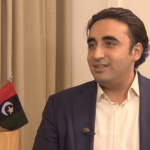WASHINGTON, Aug 26 (APP):The United States and Pakistan have a shared interest in working together in Afghanistan, Prime Minister Imran Khan’s National Security Adviser, Moeed Yusuf, has said, but pointed out that it will require fixing the bilateral relationship by “moving past their problems.”
“Afghan instability could lead to more terrorism, refugees and economic hardship for Pakistan,” he said in a phone interview with The Washington Post columnist, Josh Rogin, whose opinion piece appeared in the newspaper on Thursday under the headline: Pakistan wants to be treated like an ally, not a scapegoat.
Columnist Rogin argued that instead of engaging with Pakistan, the country is being indicted in American media coverage for its alleged support of the Taliban over the years, and he proposed that the US “seriously consider Pakistan’s offer of cooperation.”
“Right now, in the situation we are in, how are US and Pakistan’s interests not aligned?,” Moeed Yusuf, the national security adviser, asked in the interview, which Rogin worked into his column.
“I’m not asking for any sympathy for Pakistan,” the NSA said. “I’m thinking in terms of pure US selfish national interests. How does it help to push away a country of this size, stature and power?,” he asked.
Rogin also noted that Pakistan perennially stands accused of providing havens for the Taliban, but Pakistani officials point out that tens of thousands of Pakistani soldiers have died fighting extremists in their own country since 9/11.
“Pakistan is the victim. We had nothing to do with 9/11. … We teamed up with the US to fight back … and after that there is a major backlash on Pakistan,” Yusuf said. “But let’s let all that pass. We need to work out how to move forward as partners, because neither side can do without the other in terms of stability in the region.”
The US-supported government in Kabul, he said, used Pakistan as a scapegoat to excuse its own ineptitude, corruptions and unpopularity. Pakistan helped bring the Taliban to the negotiating table at Washington’s request, got cut out of the negotiations and is now being blamed for the outcome, it was pointed out.
“Did Pakistan tell the Afghan National Army not to fight? Did Pakistan tell Ashraf Ghani to run away?” Moeed Yusuf said. “The entire state collapsed in a week. So somebody was lying, somebody was misreporting, or somebody was mistaken about the reality and when it came to informing the taxpayers of the Western world.”
Noting PM Khan’s government last week’s statement about the Taliban’s takeover, Rogin said it “becomes apparent there is actually significant overlap with the Biden administration’s policy goals.”
Pakistan, the columnist pointed out, is calling for the Taliban to work with other ethnic groups toward a political settlement to establish an inclusive government in Kabul. Pakistan has urged the Taliban to respect international law and human rights, and he also wrote that Islamabad agrees with President Joe Biden that withdrawing all US troops was the right decision.
Pakistan also wants the United States to increase its diplomatic and economic involvement in Afghanistan and to find a way forward to engage diplomatically with the Taliban, Rogin said, referring to the Pakistani statement.
On his part, Moeed Yusuf said, the United States should not isolate Afghanistan to punish its new rulers.
“Now that the Taliban has the whole country, they don’t really need Islamabad as much anymore,” he said. “Assistance and recognition is the leverage. Who has that? It’s the Western countries that have much more leverage in Afghanistan than Pakistan.”
In this regard, Rogin carried in his column former US Ambassador to Afghanistan and Pakistan Ryan Crocker remarks in The New York Times last week that the United States made a mistake by disengaging with Pakistan in the 1990s and would be repeating that mistake by turning away from Islamabad now.
“We need to be engaged with Pakistan on ways to assess and deal with this enhanced threat,” wrote Crocker. “The prospect of violent destabilization of a country with about 210 million people and nuclear weapons is not a pretty one,” the diplomat added.
The NSA told Rogin that the US-Pakistan relationship can’t be just about Afghanistan; the two countries share a much broader range of interests. But first, the United States must learn the lessons of the 1990s, when it abandoned Afghanistan. Otherwise it can expect a similar outcome.
“If a security vacuum is left in Afghanistan by abandoning it, you will see that these terrorist organizations take root again. Let’s not kid ourselves,” Moeed Yusuf said.
In his concluding comments, Rogin wrote, “Given (President Joe) Biden’s haphazard withdrawal from Afghanistan and the Taliban takeover, the United States has little alternative but to seriously consider Pakistan’s offer of cooperation. Sure, it might not work, but it’s worth a shot.
“Meanwhile, Washington and Islamabad might find a path back to being true allies. That still makes strategic sense for both countries, perhaps now more than ever,” the columnist added.







